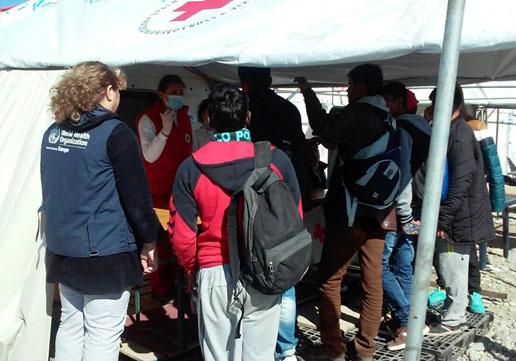WHO and the Ministry of Health strengthen response to refugee and migrant crisis in the Former Yugoslav Republic of Macedonia

WHO/Dragi Tarcugovski
According to the Office of the United Nations High Commissioner for Refugees (UNHCR), the number of refugees and migrants crossing the former Yugoslav Republic of Macedonia on the way to west-European countries significantly increased during the last month. On 16 September 2015, approximately 4000 refugees and migrants were registered at Gevgelija Transit centre (close to the Greek border) and the number of registered refugees and migrants reached 7900 on 7 October 2015.
Between 19 June and 10 October 2015, police registered 130 727 foreign citizens who received certificates expressing their intention to submit a request for recognition of the right to asylum. Of these, 65% are men; 13% are women and 22% are children. According to UNHCR, most are citizens of the Syrian Arab Republic, with the rest from Afghanistan, Bangladesh, Congo, Iran (Islamic Republic of), Iraq, Nigeria, Pakistan, Palestine and Somalia.
As the number of refugees and migrants transiting through the country increases and winter approaches, WHO/Europe and the Ministry of Health have strengthened their response to adequately manage this situation including:
- daily expert missions to centres to assess the situation and identify the most urgent health needs;
- a training workshop on refugee and migrant health delivered to health and non-health professionals working with these population groups; and
- the procurement of urgent medical supplies and goods, organized by WHO/Europe as requested by the Ministry of Health.
Provision of medical assistance
Different organizations work together to provide food, water, clothes, medical care and support 24 hours a day at the transit centre Vinojug in Gevgelija.
Health care centres and hospitals from several cities in the region offer medical care including emergency transport to hospitals. A special department to treat migrants was established at the general hospital in Gevgelija. A team consisting of a medical doctor and nurse provide medical services in 2 shifts, 24 hours a day. The health care centre Gevgelija gives medicine and materials to the transit centre.
Gevgelija hospital and the clinical hospital in Skopje provide childbirth and maternal care to refugee and migrant women.
A team of medical doctors, paramedics and translators from the Macedonian Red Cross in collaboration with UNHCR provides assistance more than 1000 times a day including:
- first aid
- medical care
- transport of patients from the border crossing to the transit centre
- social/humanitarian assistance
- family reunion (tracing) services.
Assistance to refugees and migrants is also available at the resting point railway station Tabanovce (northern border crossing to Serbia). The Macedonian Red Cross offers first aid and medical care. The health care centre Kumanovo provides emergency care and transport of patients to the general hospital in Kumanovo.
Migrants are transported from the transit centre in Gevgelija to Tabanovce by train, buses and taxis. Migrants still have to walk from the Greek border to the transit centre in Gevgelija, as well as from Tabanovce to the reception centre in Preshevo, Serbia.
Public health centres in Gevgelija and Kumanovo provide public health surveillance, hygiene and epidemiological control including disinfection of transit centres, regular control of drinking-water and disease registration.
Common health problems
During the summer (August and September), most interventions were related to skin diseases (burns/blisters, allergic reactions, insect bites), pain, weapon-related wounds, respiratory and gastro-intestinal diseases, and chronic diseases (diabetes, heart diseases). In October, the number of respiratory diseases increased, but gastro-intestinal diseases were still frequent. Most patients are not willing to go to hospital, because they want to leave the country as fast as possible.
Food distribution
Several nongovernmental organizations (NGOs) are engaged in distributing fresh and canned food, as well as standard food parcels. The State Food and Veterinary Agency controls food distribution. As temperatures decrease, the Macedonian Red Cross plans to distribute hot tea to migrants.
Crisis management and coordination
The Government of the former Yugoslav Republic of Macedonia established a crisis management team to respond to the needs of the refugees and migrants. Coordination of all organizations working with these groups is organized and well-functioning. Once a week, UNHCR organizes coordination meetings to provide information, discuss issues with all stakeholders and agree on future actions.
WHO response
WHO provides support to the country to address the health needs of refugees and migrants including:
- technical and on-site assistance to increase the public health response and improve coordination of services;
- daily presence and support at transit centres by a field operation officer for health and migration; and
- identification of medical needs and recommendations.
Meetings are organized with representatives of the Ministry of Health, health centres, public health centres, hospitals in Kumanovo and Gevgelija, United Nation agencies, NGOs and crisis management centres to identify the health needs of refugees and migrants and provide assistance in problem resolution.
WHO provided crisis management training of health personnel from Gevgelija and Kumanovo regions in September 2015.
Next steps
The Ministry of Health submitted a list of urgent needs to WHO, and the procured goods are expected to be distributed in the upcoming weeks. WHO will continue to support the Ministry of Health to provide adequate health response to the large influx of migrants in the country.



